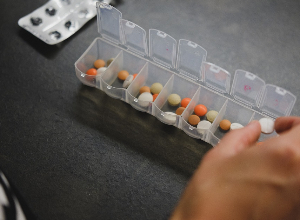Crohn's Disease diagnosis: Carenity members tell their story
Published Feb 24, 2020 • By Louise Bollecker
Symptoms, misdiagnoses, the reactions of doctors and loved ones. Our members tell their Crohn's disease diagnosis stories!

Survey conducted by Carenity with 110 respondents living with Crohn's disease in France, the US and UK.

3 years and 4 doctors consulted on average before getting diagnosed with Crohn's disease.
On average it took our members living with Crohn's disease three years to get diagnosed! The most common symptoms that alerted them to a problem were severe diarrhea and debilitating stomach pain:
Diarrhea| Abdominal Pain| Stomach Pain| Weight Loss| Vomiting| Fatigue | Depression
All of these symptoms affected members' quality of life. The patients cited fatigue and physical pain as the most disruptive symptoms.
 Chronic fatigue - 87%
Chronic fatigue - 87%
 Serious physical pain - 78%
Serious physical pain - 78%
 Work life - 65%
Work life - 65%
 Leisure and physical activities - 65%
Leisure and physical activities - 65%
 Social life - 64%
Social life - 64%
 Love life - 57%
Love life - 57%
 Family life - 53%
Family life - 53%
52% of our respondents were misdiagnosed before discovering they had Crohn's disease. The following were the most common misdiagnoses:
Gastritis| Ulcerative colitis| Food allergies or intolerances| Depression| Anorexia or other eating disorders| Stress psychotic disorders | Irritable Bowel Syndrome (IBS)| Gastroesophageal Reflux Disease (GERD)
"It had a huge impact on my life, an impact that I'm still living with to this day. Because of the misdiagnosis, I ended up losing my colon. I was operated on in May 2009. They thought it was ulcerative colitis."
"All the doctors missed it until the day that, at 35 years old, when I could no longer look after my own children by myself, I asked my GP to do every possible test he could. Crohn's was detected thanks to a colonoscopy. Before all that, 35 years of suffering and being told that it was all nerves and I was lazy...it was very hard for me emotionally!"
"I was suffering from unbearable stomach cramps, combined with gallstones that I had to be operated on for. The gastroenterologist I was seeing thought the pain was due to the gallstones but only 1 week after they were removed, the sharp pains came back even stronger. I got a colonoscopy and small bowel resection surgery, but my gastroenterologist at the time only prescribed medication which didn't help at all."
"For ten years, every doctor I saw said my symptoms were caused by stress."
Before being diagnosed, only 36% of members researched their symptoms online in an attempt to find out what was wrong with them.
 Being diagnosed with a chronic disease can turn a patient's life upside down. But at the same time, they find out why they've been in pain for so long. The patient can put a name to their symptoms and get treated by a health professional. Still, learning that they are suffering from a chronic illness can be frightening for some patients. For many of our members living with Crohn's disease, that moment was a shock.
Being diagnosed with a chronic disease can turn a patient's life upside down. But at the same time, they find out why they've been in pain for so long. The patient can put a name to their symptoms and get treated by a health professional. Still, learning that they are suffering from a chronic illness can be frightening for some patients. For many of our members living with Crohn's disease, that moment was a shock.
![]() It was a shock - 35%
It was a shock - 35%
![]() It was a relief - 32%
It was a relief - 32%
![]() It wasn't a shock, I was expecting it - 26%
It wasn't a shock, I was expecting it - 26%
![]() It was scary - 26%
It was scary - 26%
![]() I didn't feel anything in particular - 9%
I didn't feel anything in particular - 9%
![]() I don't remember - 5%
I don't remember - 5%
The role of the health professional who announced the diagnosis is key. Some patients didn't feel listened to or sufficiently informed; while others were grateful to their doctors for their caring attitude in a difficult moment. Most Carenity members living with Crohn's saw the health care professional as an ally but wished the doctor could have spent more time with them.

My doctor:
62% - took the time to explain everything to me
58% - was very calm
25% - was empathetic
15% - referred me for psychological support

My doctor:
17% - was in a hurry
14% - used only scientific jargon
13% - was cold and distant
13% - didn't seem to care
"He told my parents it was Crohn's disease. I was suffering so much that it was a relief to hear that. I was afraid it was cancer."
"He told me I had a chronic inflammatory bowel disease. Yes, it's a sickness, but you can live a normal and long life with it."
"The doctor gave me the diagnosis but he didn't give me any details about it. It was 25 years ago, he said there wasn't very much medical knowledge about the illness. He said I have ulcers in my gut and I needed to take medication for the rest of my life."
"She was rather direct and clear in her explanations, which I appreciated."
"After my colonoscopy, the gastroenterologist came to see me with 4 photos they took during the exam. He explained the images to me and that he thought I had an inflammatory disease called Crohn's disease. He explained that patients respond differently to treatments and that they were going to try a few to find the right one for me. He also reassured me that the disease can go dormant for years between flare-ups and a lot of people manage to live a normal life."
After getting diagnosed, 44% of patients felt relieved to finally have a diagnosis. 25% felt determined to fight the disease, and 12% had confidence in the future.
42% felt anguished, 38% lost, 30% angry, 25% desperate and 14% discouraged.
Loneliness also took its toll: 25% felt alone, 19% misunderstood by those around them.

A big thank you to everyone who participated in this survey! Our Carenity members took the time to share their experiences with the hope that their stories can help other patients when they get diagnosed.
"The need to know is so important. I think my doctor went about it in the best way: she told it like it was (so I could know what I was dealing with) but played down the risks because medical knowledge is increasing."
"I appreciated my doctor's empathy and his willingness to listen. But, he was trying so hard to be so reassuring that I didn't realize at first that he was giving me a diagnosis. He didn't explain all the effects of the disease or how it could evolve."
"I wish doctors would refer patients that have just been diagnosed with a chronic illness to a psychologist automatically because now I know that when I'm good in the head, I'm better in the belly. I think if I had seen a psychologist earlier, that might have spared me two serious operations later."
"I wish I would have gotten more information. They should give us documentation right away about help and associations so we can get the support we need, and more information on the illness, its symptoms, and how to live better with the illness."
Do the survey results reflect your experience? Share your experiences in the comments below!

 Facebook
Facebook Twitter
Twitter


